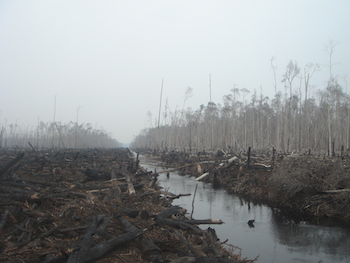 Some of the world’s largest producers and traders of palm oil have released a new initiative called the “Sustainable Palm Oil Manifesto”. They claim to be “accelerating the journey to no deforestation” but at the same time they’re refusing to halt their bulldozers while they continue to destroy rainforests and peatlands.
Some of the world’s largest producers and traders of palm oil have released a new initiative called the “Sustainable Palm Oil Manifesto”. They claim to be “accelerating the journey to no deforestation” but at the same time they’re refusing to halt their bulldozers while they continue to destroy rainforests and peatlands.
Consumers and food manufacturing companies, including the Snack Food 20, that buy palm oil from manifesto members Kuala Lumpur Kepong Berhad (KLK), Sime Darby Plantation, IOI Group Corporation Berhad, Musim Mas Group, Asian Agri and Cargill International should not be fooled by their ‘talk and log’ manifesto.
This ‘talk and log’ manifesto is a far weaker commitment than those recently adopted by other palm oil producers and traders, including Wilmar International, Golden Agri Resources (GAR) and members of the Palm Oil Innovation Group. The manifesto falls far short of these new global benchmark policies for responsible palm oil, and even attempts to undermine them.
This manifesto fails to deliver a program that will result in the rapid supply chain changes needed to end the widespread human and labor rights violations, unchecked deforestation, and climate pollution caused by Conflict Palm Oil production. In fact, if this initiative is the only action taken by the manifesto’s signatories, it could undermine the very real progress being made by other palm oil producers towards achieving truly responsible palm oil on a global scale.
Top 5 reasons the Manifesto fails to deliver
1. The manifesto does not require the signatory companies to immediately halt the clearance of potential High Carbon Stock Forests and peatlands of any depth and area.
2. The manifesto does not accept the definition and thresholds of High Carbon Stock forests and the robust HCS Approach tool that has been developed and tested now by Golden Agri Resources, The Forest Trust, and Greenpeace. Instead, the signatories are proposing to redefine High Carbon Stock forests so that instead of protection they can continue to clear ecologically important areas of secondary forests.
3. The manifesto does not bind signatories to adhere to its principles in all of the company’s operations, including subsidiaries regardless of stake.
4. There is no clear commitment to apply the principles to third party suppliers who may continue to cause deforestation, expansion on peatlands, and the violation of human and labor rights. This is a green light to continue to source Conflict Palm Oil from third party suppliers, contaminate supply chains, and undermine the progress that is being made by peers to transform the palm oil sector.
5. There is no detailed and time-bound implementation plan, transparent system of auditing, verification and monitoring of progress, nor open grievance mechanisms and dispute resolution processes.
Consumer companies such as Nestle, Unilever, Kellogg, Mars, Mondelez, Hershey and Campbell Soup should not be tricked into believing that this is more than an exercise in greenwashing and needless delay. These companies must use their buying power to tell the signatories to stop the bulldozers from clearing forests and peatlands and to earnestly resolve the widespread conflicts in their supply chains.
As one example among manifesto members, KLK was recently exposed for its controversial involvement in deforestation in Indonesia and land-grabbing and human rights violations in both Papua New Guinea and Liberia. KLK must resolve these conflicts and adopt a policy that is in line with what forests, the people that rely on them, workers and our planet need.
It’s time for real action to halt rainforest destruction, resolve conflicts and clean up palm oil supply chains, and to stop the greenwash, diversion and delay.











